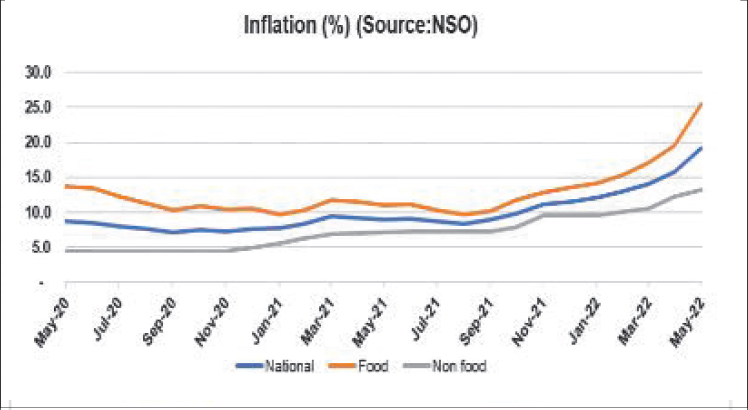Inflation on the prowl
The monster that is the country’s runaway inflation continues to devour households and firms earnings, with consumers fearing that their lives could become unbearable if rising prices continue unchecked.
Inflation, the rate of increase in prices over a given period of time, has been on the rise for the past months largely due to increase in food and non-food items.
In a space of six months, the inflation rate has nearly doubled from 12.1 percent in January to 23.5 percent as of June, according to the National Statistical Office figures.

In an interview on Tuesday, Consumers Association of Malawi (Cama) executive director John Kapito said while prices of almost all commoditiesare rising, that of maize prices continue to rise sharply, thereby creating challenges considering the significance of maize in the inflation basket.
He said: “Since maize is one of the key components in the inflation basket, its price rise has created challenges on consumers as we have noted a sharp rise in the cost of living.
“We are appealing to government to review and intervene on current maize prices which will continue to hurt consumers before we get into the lean period where prices will be uncontrollable.”
In Malawi, maize, as part of the food component, accounts for about 52 percent of the consumer price index, an aggregate basket of goods and services used in computing inflation.
In June, food and non-food inflation rose to 31.2 and 16.6 percent, from the previous month’s 19.5 percent and 12.2 percent, respectively.
A recent market survey by Cama shows that between May 2022 and July 2022, maize prices, now selling at an average of K18 000 per 50 kilogramme (kg) bag, has risen by 100 percent.
On the other hand, maize flour prices have gone up by 77 percent from an average of K8 388 to K14 888 per 20 kg while bread, sugar and egg prices have also gone up.

Non-food items have not been spared either, with the most notable price increases of basic household items such as soap.
Centre for Social Concern economic governance officer Benard Mphepo said in an interview that most Malawians are hardly surviving as incomes are not reflecting the cost of living.
He said at K50 000 as minimum wage, the income levels fall below minimum requirements of the cost of food items and minimum cost of living, now hovering at around K300 000 per month for a family of six.
Such is the fate for Fadwick Mpeketula, a casual labourer, working for a manufacturing firm in Blantyre.
He earns K14 000 per fortnight, translating to a monthly income of K28 000.
Said Mpeketula: “While my house rental has remained at K8 000 per monthly, prices for all other items, including maize have kept rising.”
However, while confirming that employers are aware that inflation is affecting employees and eroding their purchasing power, Employers Consultative Association of Malawi executive director George Khaki said employers are not spared from the price increases, which has pushed up production costs and eating up profits.
He said: “In the meanwhile, we encourage employers and workers to go into genuine social dialogue at enterprise level to identify challenges and agree on how best these challenges can be tackled to ensure that the welfare of employees is well taken care.”
In its May 2022 Monthly Economic Report, Nico Asset Managers Limited said with inflation now running at multi-decade highs in many countries, there is a risk that inflation will remain higher for longer than currently anticipated.
Reads the report in part: “Inflation rate is likely to remain on an upward trajectory due to a rally in global commodity prices and the adverse impacts of weather shocks on food prices in the country.
“Rising prices will have a negative impact especially on lower income households’ access to food and necessities.”
Reserve Bank of Malawi (RBM) admits that the current sources of inflation pressures are also posing an additional challenge to an inclusive recovery, as it is affecting low-income households that spend a much larger share of their income on food items.





